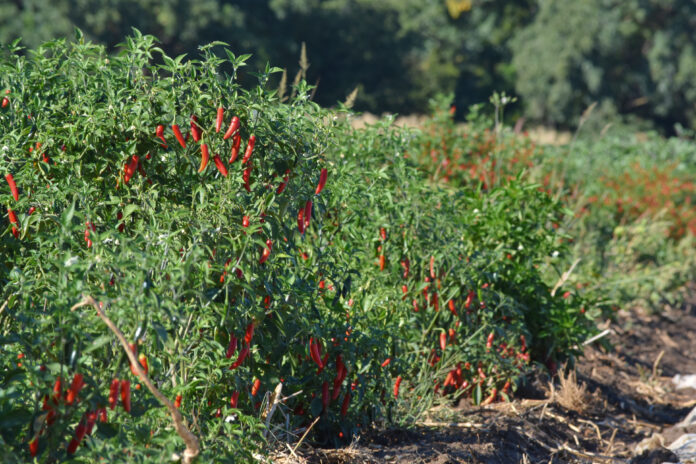Yolo country celebrates local farming and small-scale production during “Farm to Fork” month
By LEVI GOLDSTEIN — features@theaggie.org
In 1908, UC Davis first opened as an extension of UC Berkeley in the form of an agricultural school — hence why students are known as “Aggies.” Ever since, the University’s agricultural roots have remained central to its image and academics. According to Yolo County residents, agriculture is a fundamental part of the local community.
Davis’ location in the Central Valley means it is right in the center of the largest source of agricultural exports in the United States. The Sacramento Valley is known as the “Farm to Fork” capital of the country, according to a Yolo County press release.
For Vince Marchese, the marketing manager of the Davis Food Co-op, the local farms are a gift worth appreciating.
“It’s a shame, really, sometimes that people are […] buying products that come from other places in the world when we have such good, high-quality local products that we all can benefit from,” Marchese said. “Not only are we giving them the best high-quality products that there are because they’re grown right in our backyard, but we’re also keeping our local economy alive and helping out our neighbors.”
The local food is delicious, and it also offers an opportunity for human connection. The Davis Food Co-op, a local grocery store cooperatively owned by over 8,000 Davis residents, openly tries to create a space where community members can gather and socialize, according to Marchese.
“We’re not just here to function as a grocery store,” Marchese said. “Food is such a big part of all of our lives. On a weekly basis, usually, people are coming and […] they’re spending a lot of time at the grocery store getting the food that’s going to nourish them throughout the week. We feel the importance that while we have you there, we can really show you the deeper sense of connection that goes into everything we’re doing in the store.”
Marchese said that the Davis Food Co-op also prioritizes forming strong relationships with local farms.
“If somebody is shopping [for] produce, right beneath the apples, they may see this local farm guide, pick that up, and now they get to learn a little bit more about the farmer that picked that apple, or the farmer that grew the tomatoes that are just right across from there,” Marchese said. “We have very direct and personal relationships with the farmers [who] grow that produce. We want you to feel that connection too. We are just a part of this bigger ecosystem, and we want to try to show the ways in which that entire ecosystem fits together.”
In addition to in-store guides, the Davis Food Co-op publishes articles and recipes on their online blog and offers classes in their teaching kitchen for a hands-on cooking experience.
Another local educational resource is the Hanna and Herbert Bauer Memorial Garden, located just outside the Yolo County Health and Human Services Agency (HHSA) Bauer Building in Woodland. Founded in 2013, it serves as an “outdoor classroom space” for programs hosted by the HHSA and the CalFresh Healthy Living program, according to HHSA Program Coordinator David Linebarger.
“I’m a farmer at heart,” Linebarger said. “I really like to teach people how to grow food, and I like to see their journey with growing food and people getting better at it and seeing their surprise when they learn things that they didn’t know before, and just the satisfaction that gardening brings is really what keeps me doing it.”
Yolo County celebrates local agriculture by hosting “Farm to Fork” month every September. This month, the Hanna and Herbert Bauer Memorial Garden offered a class on food preservation, its first since the COVID-19 pandemic, according to a Yolo County press release. The garden also leases plots for residents to grow their own food.
Linebarger said teaching residents how to grow their own food has helped reduce food insecurity in Yolo County.
“People save money by growing their own food,” Linebarger said. “There’s a lot of resilience involved. It’s increasing food security for residents. When there’s more local produce being grown and accessible to people, it’s less that they have to buy at the store.”
Small-scale production can also help mitigate climate change, according to Linebarger.
“It’s less miles to the store, less driving time,” Linebarger said. “And then you’re not supporting ‘Big Ag’ with more environmentally unsustainable farming practices when produce is being grown and eaten at a local level. Large farms — the kind of farming that requires tractors, that uses a lot of fertilizer, […] the high overhead costs of big farming, plus the fossil fuels that are being used […] — it’s not as environmentally sustainable as small-scale local agriculture.”
Davis residents can visit the Davis Farmers Market to purchase fresh produce and baked goods directly from local farmers and businesses and meet some of the people who grow the food that stocks local kitchens.
UC Davis students can also get involved in small-scale agriculture on campus at the Student Farm, which sells produce to campus dining halls and organizes programs to address food insecurity and environmental devastation.
Written by: Levi Goldstein — features@theaggie.org





